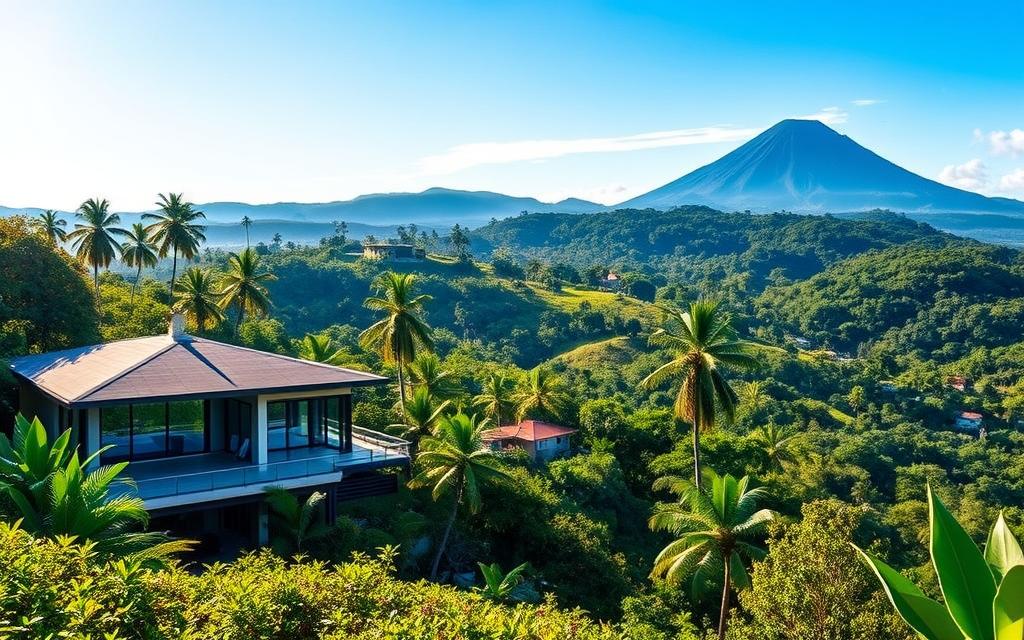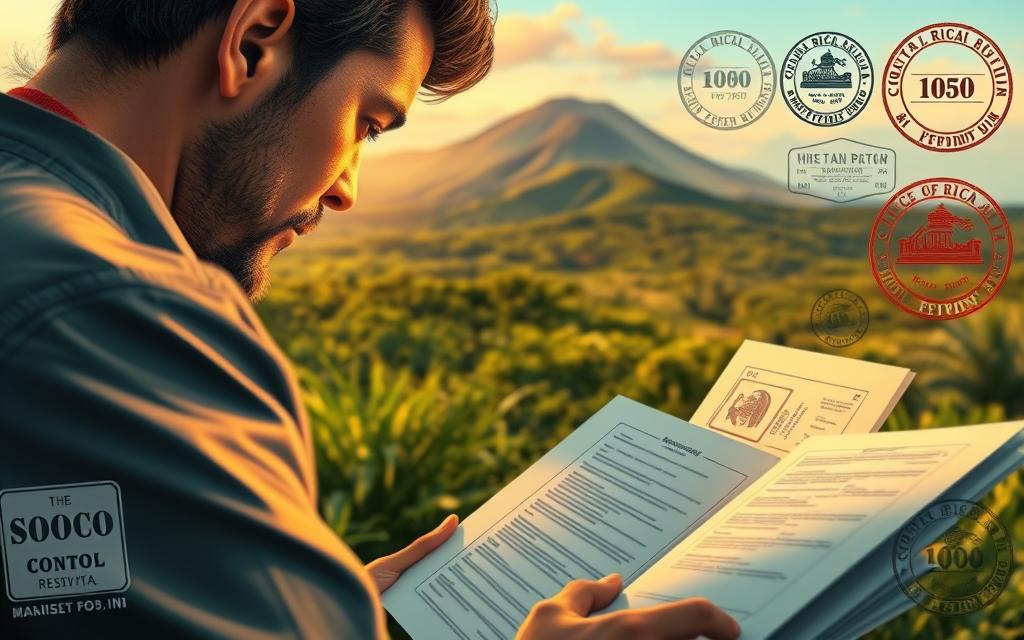Compare Investor Residency vs Permanent Residency in Costa Rica

Did you know that over 100,000 expats have chosen Costa Rica as their new home? This Central American gem is not just a tropical paradise but also a hub for those seeking a better quality of life. With its lush landscapes, mild climate, and welcoming culture, it’s no wonder so many are drawn here.
When considering a move, understanding the different residency options is crucial. Whether you’re exploring pathways through real estate investments or fixed-income programs, Costa Rica offers diverse choices to suit various lifestyles and goals. Each option comes with unique benefits, from improved global mobility to access to the country’s renowned healthcare system.
This guide will help you navigate the key differences between investor and permanent residency. We’ll break down eligibility, investment requirements, and the application process to ensure you make an informed decision. Let’s dive into what makes Costa Rica a top destination for those seeking a fresh start.
Understanding Costa Rica’s Residency Landscape
Costa Rica’s residency programs are tailored to meet diverse needs and goals. Whether you’re planning to retire, invest, or simply enjoy a better quality of life, the country offers pathways that align with your aspirations.
Overview of Residency Options
There are several programs available, each designed for specific circumstances. The Pensionado program is ideal for retirees, requiring a monthly income of at least $1,000. For those with stable income, the Rentista program mandates a $60,000 deposit or monthly transfers of $2,500 for two years. The Inversionista program is perfect for individuals looking to invest, with a minimum requirement of $150,000 in real estate or stocks.
These programs cater to different financial situations, ensuring there’s an option for everyone. Whether you’re seeking short-term stability or long-term benefits, Costa Rica’s residency landscape is flexible and accommodating.
Benefits of a Diverse and Welcoming Environment
Living in Costa Rica means becoming part of a vibrant and inclusive community. The country is renowned for its friendly locals and rich cultural heritage. From lush rainforests to pristine beaches, the natural beauty enhances the quality of life for residents.
Access to affordable healthcare and quality education further adds to the appeal. The public healthcare system is accessible to legal residents, ensuring peace of mind. Additionally, international schools provide excellent opportunities for families.
Choosing the right residency program can optimize your experience. It opens doors to investment opportunities, cultural integration, and long-term stability. Costa Rica’s welcoming environment makes it an ideal destination for those seeking a fresh start.
Investor Residency vs Permanent Residency in Costa Rica

Choosing the right pathway to residency can significantly impact your future in Costa Rica. Understanding the eligibility criteria and long-term benefits of each option is essential for making an informed decision. Let’s explore the key differences and advantages of these programs.
Key Differences in Eligibility
Eligibility for investor residency requires a minimum investment of $150,000 in a business or property. This option is ideal for those looking to contribute to the local economy while securing their status. On the other hand, permanent residency is typically achieved after holding temporary status for three consecutive years.
Both pathways require a clean criminal record and proper legal documentation. Fingerprinting and apostilled documents, such as birth certificates, are mandatory. Meeting these requirements ensures a smooth application process.
Long-Term Benefits Comparison
Investor residency offers immediate benefits, including tax exemptions on imported household goods and vehicles. It also allows dependents, such as spouses and children under 24, to be included in the application. This option provides flexibility and financial advantages for families.
Permanent residency, however, grants long-term stability and access to the country’s public healthcare and education systems. After three years, transitioning from investor to permanent residency becomes a viable option. This pathway is ideal for those planning to establish deeper roots in Costa Rica.
Both options provide unique advantages, depending on your goals. For detailed guidance on legal requirements, visit our comprehensive guide.
Investment Requirements and Financial Considerations

Understanding the financial commitments is crucial when planning your move. Meeting the criteria ensures a smooth transition and helps avoid delays in the application process. Let’s explore the key aspects of investment and financial obligations.
Minimum Investment Standards
The minimum investment required is $150,000, which can be allocated to approved categories. These include real estate, business ventures, or corporate shares. This threshold ensures that applicants contribute meaningfully to the local economy.
For example, purchasing property worth at least $150,000 qualifies for the program. Alternatively, investing in stocks or securities can also meet the requirement. Combining multiple investments is allowed, provided the total reaches the minimum threshold.
Additional Financial Obligations
Beyond the minimum investment, applicants must account for additional costs. These include processing fees, government charges, and legal documentation expenses. Translations of documents not in Spanish are also required.
Applicants must provide a clean criminal record, which is a critical part of the process. Fingerprinting and apostilled documents, such as birth certificates, are mandatory. Ensuring all paperwork is complete avoids setbacks during review.
For more details on property-related requirements, visit our comprehensive guide. Proper financial due diligence and adherence to government requirements are essential for a successful application.
Legal and Documentation Requirements
Navigating the legal requirements for residency can feel overwhelming, but proper preparation simplifies the process. Ensuring all documents are accurate and complete is essential for a successful application. Let’s break down the key steps to streamline your journey.
Essential Personal and Property Documents
To apply, you’ll need several critical documents. These include your passport, birth certificate, and a clean criminal record from your home country. All documents must be translated into Spanish and apostilled for legalization.
For property ownership, you’ll need proof of investment, such as a property title. This document must also be apostilled and submitted with your application. Properly preparing these records ensures compliance with local regulations.
Supporting Legal Criteria
Additional steps include notarized forms, consular registrations, and fingerprint registrations. These supporting criteria validate your application and demonstrate your commitment to meeting all requirements.
Maintaining accurate tax records can serve as an advantage during the review process. It shows financial responsibility and adherence to local laws. Submitting every form correctly prevents delays and ensures a smooth transition.
By following these guidelines, you can confidently prepare your application. Proper documentation is the foundation for securing your status in this vibrant destination.
Navigating the Application Process in Costa Rica

Applying for residency in Costa Rica is a straightforward process when you know the steps. We’ll guide you through each stage, from initial document submission to final approval. This ensures you stay on track and avoid common issues.
Step-by-Step Guide to Application
Start by gathering all required documents. These include your passport, birth certificate, and a clean criminal record. Ensure each document is translated into Spanish and apostilled for legalization.
Next, schedule your fingerprinting appointment. This is a mandatory step for all applicants. Properly preparing for this step avoids delays in the process.
Submit your application within the prescribed period. Missing deadlines can cause unnecessary setbacks. If any issues arise, address them promptly to keep your application moving forward.
Once submitted, you’ll receive a “Hoja trámite” certificate. This allows you to stay legally in the country while your application is processed. Keep this document safe, as it’s essential for your status.
For temporary residency, renewal is required before transitioning to permanent status. This ensures continuity and compliance with local laws. Follow the renewal process carefully to maintain your eligibility.
Finally, understand the pathway to citizenship. After holding temporary residency for three years, you can apply for permanent status. This opens the door to long-term stability and additional benefits.
For more detailed guidance, visit our comprehensive guide. Proper preparation and adherence to timelines are key to a successful application.
Quality of Life and Lifestyle Advantages
Costa Rica’s welcoming environment and high quality of life make it a top choice for those seeking a fresh start. From exceptional healthcare to bilingual education, the country offers numerous benefits for families and individuals. Additionally, its vibrant communities and cultural richness ensure a smooth transition for newcomers.
Healthcare and Education Opportunities
One of the most significant advantages of obtaining residency is access to Costa Rica’s renowned healthcare system. Legal residents can enroll in the Caja Costarricense de Seguro Social (CCSS), which covers pre-existing conditions and provides affordable care. This ensures peace of mind for families and individuals alike.
Education is another key benefit. Public schools offer local tuition rates, making education accessible and affordable. For families seeking bilingual education, international schools provide excellent opportunities. These institutions foster academic growth and cultural understanding, preparing students for a global future.
Community and Cultural Integration
Costa Rica’s communities are known for their warmth and inclusivity. New residents often find it easy to adapt, thanks to local initiatives that promote cultural integration. Participating in community activities or setting up a company can help build lasting connections and contribute to the local economy.
The country’s rich cultural heritage also plays a role in making newcomers feel at home. From festivals to local traditions, there are countless ways to immerse yourself in the vibrant Costa Rican lifestyle. This sense of belonging enhances the overall quality of life for residents.
Whether you’re drawn by the healthcare system, educational opportunities, or the welcoming communities, Costa Rica offers a sustainable and enriching lifestyle. Proper preparation, including gathering the necessary documents, ensures a smooth transition into this tropical paradise.
Insights from Industry Experts and Legal Advisors
Legal advisors play a crucial role in simplifying the residency application process. With their extensive experience, they provide invaluable guidance to families and individuals seeking to obtain residency. Their expertise ensures that all requirements, from passport documentation to clean criminal records, are met efficiently.
Experience-Based Guidance
Experts like Herman Duarte emphasize the importance of meticulous preparation. Ensuring your passport is valid and all documents are apostilled and translated into Spanish is essential. A clean criminal record is also mandatory, as it demonstrates your eligibility for residency.
Legal advisors can help streamline the process by identifying potential issues early. They provide practical recommendations, such as organizing financial records and understanding local government requirements. This proactive approach minimizes delays and ensures a smooth application.
For families, professional support is particularly beneficial. Advisors can assist in including dependents in the application, ensuring everyone meets the criteria. Their guidance helps navigate the complexities of residency programs, making the transition seamless.
Understanding local laws and procedures is another advantage of consulting experts. They can clarify investment requirements, such as the minimum USD threshold, and ensure compliance with all regulations. This knowledge is critical for a successful application.
For more detailed advice on maintaining your status, visit our comprehensive guide. Professional support not only simplifies the process but also provides peace of mind for applicants.
Conclusion
Making the right choice for your future in a new country requires careful consideration of all available options. Whether you’re drawn to immediate benefits or long-term stability, understanding the specifics is key. Each pathway offers unique advantages, from financial flexibility to access to world-class healthcare and education.
For those seeking a fresh start, the quality of life here is unmatched. The welcoming communities and vibrant culture make it easy for every individual to feel at home. Additionally, the pathway to citizenship provides long-term opportunities for personal and financial growth.
We encourage you to assess your goals and use this guide as a resource. For those interested in real estate investment, professional consultation can simplify the process. Your future in this tropical paradise is full of potential—take the first step today.


